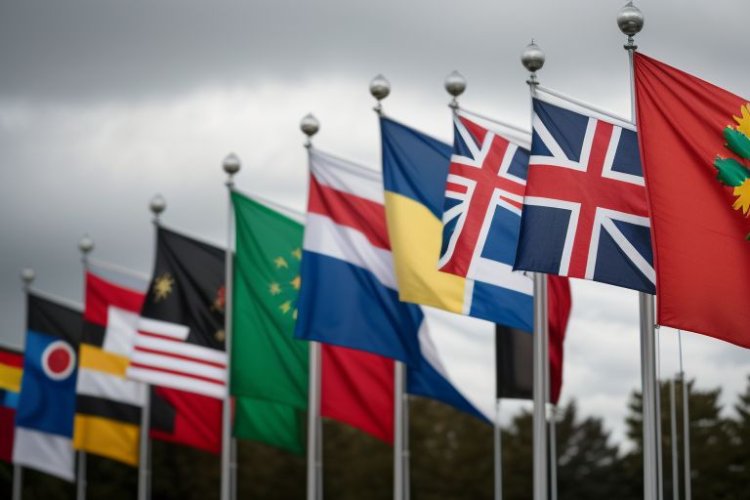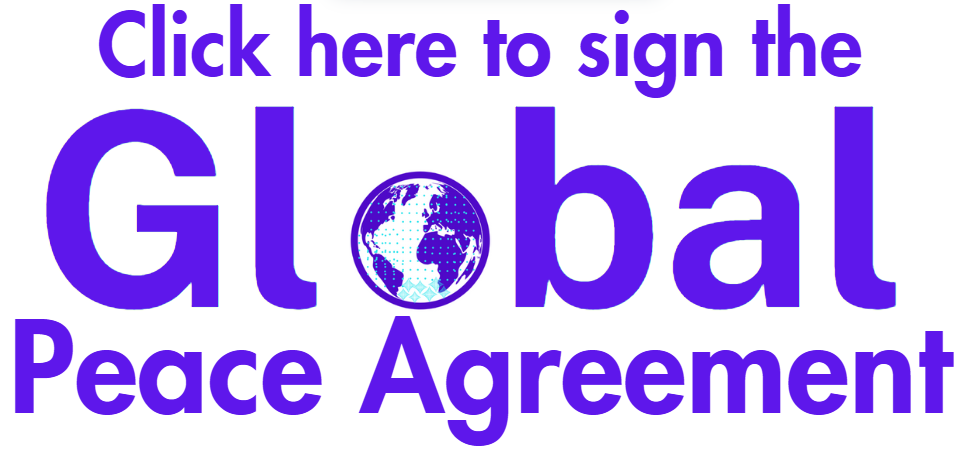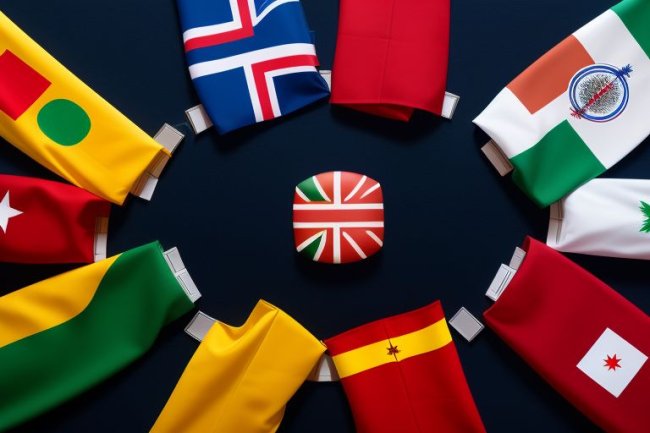MULTILATERAL AGREEMENTS AND EQUALITY OF VOTES
In the labyrinth of international diplomacy, where diverse nations converge to tackle global challenges, Multilateral Agreements and Equality of Votes emerge as a cornerstone of equitable collaboration. As the world navigates intricate webs of interdependence and mutual interests, the significance of multilateral agreements cannot be overstated. These agreements, akin to symphonies composed of diverse voices, harmonize the aspirations and efforts of nations toward shared goals.

Central to this discourse is the principle of "Equality of Votes," an embodiment of democracy on the global stage. In a realm where the powers of nations vary vastly, the concept underscores the belief that every voice, regardless of size or influence, holds intrinsic value. The scale may differ, but the vote remains an equalizer, a beacon guiding negotiations and fostering inclusivity.
This chapter explores the dynamic interplay between multilateral agreements and the fundamental tenet of equal voting rights. It delves into the historical tapestry where nations converged to address issues that transcend borders, showcasing the metamorphosis of diplomacy from a bilateral affair to a collaborative symposium of nations. The chapter navigates through the annals of time, illuminating milestones where multilateral agreements paved the way for innovative solutions, laying the groundwork for a fairer, more balanced world order.
The threads of this discussion weave through the intricacies of diplomacy, shedding light on how international conventions and treaties have forged alliances that transcend individual interests. It dissects the nuances of negotiations where countries, each armed with an equal vote, engage in the intricate dance of compromise and consensus-building. From climate accords to trade agreements, the power of multilateralism and equal votes resounds, shaping the global landscape one resolution at a time.
The Evolution and Efficacy of Multilateral Agreements
The concept of multilateral agreements, also known as international treaties or conventions involving multiple nations, has evolved significantly throughout history. These agreements are pivotal in fostering cooperation, resolving disputes, and promoting shared goals among nations. The efficacy of multilateral agreements has been a subject of intense scholarly discourse.
The historical evolution of multilateral agreements is a tapestry woven with the threads of human interaction, diplomacy, and the changing dynamics of global politics. This journey through time reveals how these agreements have transformed from informal alliances of antiquity to the cornerstone of modern international relations.
In the annals of history, the roots of multilateral agreements can be traced to the early civilizations that sought to establish cooperative frameworks for mutual benefit. Empires, city-states, and tribal societies engaged in treaties and alliances for myriad purposes, ranging from military collaborations and trade facilitation to diplomatic dialogue. While often informal and context-specific, these agreements laid the groundwork for the principles of cooperation and mutual understanding that underpin contemporary multilateral diplomacy.
Nevertheless, the rise of modern international law brought multilateral agreements into a formalized and organized realm. A crucial juncture in this development was the Peace of Westphalia in 1648, a collection of treaties that signaled the conclusion of the Thirty Years' War and the Eighty Years' War. These treaties introduced the concept of state sovereignty, recognizing individual states' autonomy and territorial integrity. Moreover, they laid the foundation for the non-interference principle in other state's internal affairs, a cornerstone of multilateral agreements that persists today.
The 20th century heralded a seismic shift in the landscape of multilateral agreements, largely in response to the cataclysmic events of World War I and World War II. The League of Nations, established after the Great War, represented a collective endeavor to prevent future conflicts through diplomacy, cooperation, and collective security. While the League aimed to promote global harmony, its efficacy could have been improved by various factors, including the absence of key powers like the United States and the limited ability to enforce its decisions.
The aftermath of World War II brought forth an even more robust and comprehensive international institution – the United Nations (UN). Founded in 1945, the UN emerged as a multifaceted forum for addressing the international community's challenges. With an expanded mandate encompassing peace, security, development, and human rights, the UN marked a watershed moment in the evolution of multilateral agreements. It represented an audacious effort to harness the collective power of nations to prevent further global conflict, promote socio-economic progress, and safeguard human dignity.
The historical journey of multilateral agreements is characterized by an evolution from informal alliances to formal treaties, from diplomatic negotiations to structured international organizations. This serves as proof of the ever-evolving terrain of global politics, humanity's desire for harmony and teamwork, and the continuous endeavor to strike a balance between national independence and international collaboration. As our world navigates complex challenges, the historical evolution of multilateral agreements stands as evidence of the potential inherent in collaborative diplomacy and the impact of shared ambitions on shaping history.
Role of Multilateral Agreements in Promoting Equality Among Nations
Multilateral agreements serve as dynamic instruments in international relations, fostering equality among nations. As the global stage continues to evolve, these agreements stand as powerful mechanisms that transcend borders, cultures, and political ideologies. Their pivotal role in promoting equality among nations is underscored by the principles they embody and the avenues they provide for nations to collaborate.
The following are how multilateral agreements contribute to the achievement of equality on the international stage:
- Normative Framework for Equality
Multilateral agreements establish a normative structure that sets forth regulations, standards, and principles universally applicable to all nations involved.
This system guarantees that no country is free from the commitments outlined in the agreement. The UN General Assembly, for instance, emphasized the inherent equality of all people and the significance of non-discrimination, regardless of country, in the Universal Declaration of Human Rights, which was approved in 1948.
- Equal Participation and Representation
Multilateral agreements often require the equal participation of all member nations in decision-making processes. This democratic principle ensures that the interests of smaller and less powerful nations are not overshadowed by those of larger and more influential states. The United Nations General Assembly exemplifies this by affording each member state an equal vote, regardless of size or economic strength.
- Addressing Global Challenges
Multilateral agreements serve as platforms for nations to collectively address global challenges that transcend borders, such as climate change, infectious diseases, terrorism, and nuclear proliferation. These agreements acknowledge that these issues affect all nations, regardless of their economic, political, or military power, emphasizing common but differentiated responsibilities.
- Conflict Resolution and Peacekeeping
Multilateral agreements play a vital role in conflict resolution and peacekeeping efforts. Through mechanisms like the International Court of Justice and peacekeeping missions authorized by the UN Security Council, nations can seek impartial arbitration and intervention in disputes, ensuring that weaker nations are not subjected to the unilateral decisions of stronger ones.
Efficacy of Multilateral Agreements in Promoting Equality
While the concept of multilateral agreements holds great promise for promoting equality among nations, their efficacy is subject to various challenges and criticisms:
- Power Imbalances
One of the major challenges lies in the persistence of power imbalances among nations. Stronger and more influential nations often wield disproportionate influence in negotiations and decision-making processes. This can lead to unequal implementation and enforcement of agreements, undermining equality.
2. Non-Compliance and Selective Implementation
Some nations may selectively implement or disregard the terms of multilateral agreements, especially if they perceive their national interests as being compromised. This non-compliance undermines the effectiveness of agreements and hampers the achievement of equality.
3. Lack of Enforcement Mechanisms
Many multilateral agreements need robust enforcement mechanisms. While some agreements empower international bodies like the UN Security Council to impose sanctions or use force in case of violations, these mechanisms often need to be improved by geopolitical considerations and great power politics.
4. Cultural and Contextual Differences
Multilateral agreements must consider participating nations' diverse cultural, political, and economic contexts. What may be considered equitable and fair in one cultural context might not necessarily hold for another. This challenge requires careful consideration to avoid imposing norms that do not respect the equality of diverse nations.
The evolution of multilateral agreements represents a remarkable development in international relations, fostering cooperation and shared goals among nations. Their role in promoting equality among nations is evident through establishing normative frameworks, equal participation, and pursuing common objectives. However, challenges such as power imbalances, non-compliance, and the need for enforcement mechanisms raise questions about their efficacy in achieving true equality.
Efforts to enhance the efficacy of multilateral agreements should focus on addressing power imbalances, strengthening enforcement mechanisms, and ensuring inclusivity in decision-making processes. Fostering a culture of respect for diverse perspectives and contexts is crucial for achieving equality among nations through multilateral agreements. While they may not be a panacea, multilateral agreements remain indispensable for creating a more just and equitable global order.
Evaluating the Role of Voting Equality in Global Decision-Making
The quest for global equality is complex, with variations in cultures, economies, and political systems. The idea of vote equality in international decision-making processes is the foundation of this attempt. The necessity of equitable representation for all countries becomes center stage as the need for international collaboration and diplomacy in resolving transboundary concerns like climate change, conflict resolution, and economic growth increases.
Equality in global decision-making is rooted in sovereignty and the right to self-determination. The United Nations, a prominent global organization, recognizes the equal rights of states to participate in decision-making processes. The General Assembly, a paramount example, assigns each UN member state a single vote, epitomizing that larger and more powerful nation should not unduly sway global community decisions.
The implications of voting equality ripple across numerous dimensions. Firstly, this approach fosters inclusivity and diversity in global decision-making, enabling smaller and less economically potent nations to voice their concerns and engage in shaping global policies. The amalgamation of diverse perspectives enriches the discourse and paves the way for more comprehensive and effective solutions.
Secondly, voting equality ensures equitable distribution of benefits and burdens in global challenges. Decisions forged without voting equality might disproportionately burden specific nations while privileging others. This balance ensures policies that resonate with fairness and long-term sustainability, benefitting all nations collectively.
Thirdly, voting equality contributes to the reinforcement of international law and norms. By adhering to the principles of voting equality, international norms and laws gain authenticity and are more likely to be respected and followed by states. This dynamic strengthens the broader fabric of global governance and cooperation.
However, challenges and critiques cast a shadow on voting equality. Despite the theoretical premise, power imbalances between nations persist, exerting informal influence on decisions. Powerful nations might employ lobbying, financial aid, or diplomatic networks to undermine the true essence of equality subtly. Consequently, the pursuit of consensus among a heterogeneous group of nations becomes a formidable collective action problem, where the interests of some nations may eclipse global common goods, leading to a deadlock or diluted resolutions.
Furthermore, the composition of decision-making bodies might need to accurately reflect the contemporary global power distribution, sidelining emerging economies and marginalized regions. Additionally, resource disparities can hamstring smaller nations, limiting their ability to participate in global decision-making actively. In this context, their equal voting rights might carry less weight in the face of practical challenges.
Moreover, concerns about national sovereignty can cast a pall over the notion of global decision-making. Powerful nations may interpret international cooperation as an infringement on their sovereignty, engendering resistance and non-cooperation, thus impeding progress on pressing global issues.
In order to promote voting equality and, by extension, global equality, various strategies can be employed. The reform of existing structures within global organizations stands as a paramount initiative. The United Nations, for instance, should undertake regular assessments and reforms to align decision-making structures with contemporary geopolitical realities. This might necessitate adjusting voting power, amplifying the representation of emerging economies, and enhancing transparency in decision-making processes.
Capacity building is another avenue for nurturing voting equality. Global institutions could support smaller and less developed nations to enhance their capabilities for effective engagement in global decision-making. This support could manifest as technical assistance, training programs, and allocation of resources to empower these nations to participate more assertively.
Strengthening multilateral diplomacy remains pivotal. Through open dialogues, negotiations, and cooperative efforts, nations can overcome power imbalances and forge a consensus that advances the common good. Multilateral diplomacy also underlines the significance of compromise and the need to accommodate diverse perspectives.
Encouraging civic engagement on the global stage can invigorate the commitment of governments to prioritize global issues. A citizenry well-informed about the implications of global decisions can exert pressure on governments to consider the broader international consequences of their actions, thus amplifying the push for voting equality.
Finally, an emphasis on global education can cultivate a populace that comprehends the value of global cooperation and the role of voting equality in achieving equality among nations. A well-educated citizenry is better equipped to navigate the complexities of global governance, propelling the mission for voting equality forward.
In conclusion, the world's interconnectedness underscores the profound importance of voting equality in global decision-making processes. Although challenges such as power imbalances and resource disparities persist, the principles of inclusivity, fairness, and mutual benefit underscore the necessity of upholding voting equality. Humanity can progress towards a more equitable and just global order by reforming existing structures, promoting capacity building, strengthening multilateral diplomacy, encouraging civic engagement, and enhancing global education. In a landscape defined by intricate challenges, transcending national boundaries, the nurturing of voting equality remains a linchpin in fostering equality among nations and steering the world toward a sustainable and prosperous future for all.




















